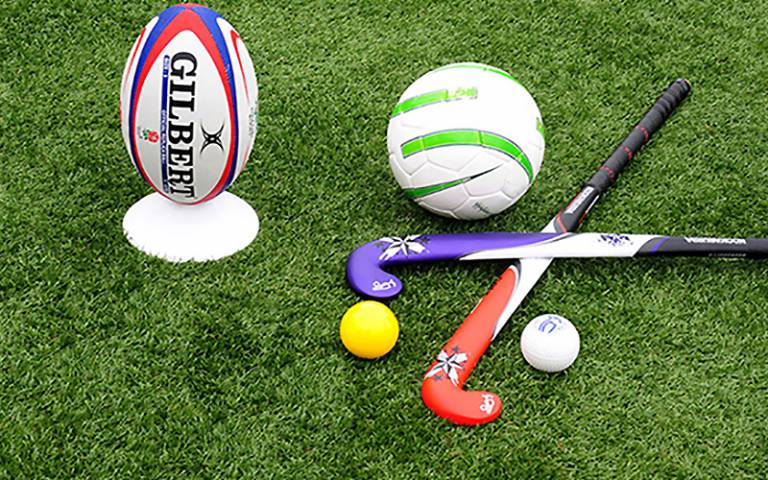Introducing simple oral health measures help improve athletic performance
19 June 2020

A new study has found that encouraging elite athletes to adopt simple preventative measures can help reduce the negative impact of poor oral health on performance.
Researchers from our Centre for Oral Health and Performance, screened 62 sportsmen and women for diseases such as caries (tooth decay) and gingivitis (gum inflammation) before providing tailored advice and an oral health toolkit.
The athletes were also asked to brush their teeth for at least two minutes, twice a day with high fluoride toothpaste and to clean between their teeth.
After four months, it was found that these behaviour changes had led to reductions in self-reported, negative performance impacts and to improvements in oral health behaviours.
Lead researcher, Dr Julie Gallagher, said: “Our previous studies have found that poor oral health amongst elite athletes is common and is associated with negative performance.
“However, compared with other health and training pressures, oral health care is not a high priority in elite sport.
“We therefore wanted to develop a programme which was aligned with the existing high-performance culture of the athletes and their teams.
“Underpinning the study was health behaviour psychology, which included education, self-motivation, goal setting, and an easy to use toolkit, ensuring the athletes had a readily available opportunity to improve.”
Two Great Britain Olympic Teams, rowing and cycling, and one Premiership Rugby Club, Gloucester Rugby, participated in the study.
Before beginning, athletes and support teams were asked to watch a 10-minute presentation designed to build motivation to improve oral health, and three 90-second information films.
At the end of the study, they were asked to fill in an oral health knowledge questionnaire, undergo a follow-up assessment and evaluate the oral health kit.
Dr Gallagher added: “Through our previous research and focus group sessions, we established that athletes’ motivations for taking part in the study were both appearance and athletic performance, with many keen to avoid gum inflammation affecting other parts of their bodies, which can happen in serious cases.
“We believe that bringing behaviour change science together with an understanding of the athletes’ and teams’ priorities is key to making changes stick.”
Co-author Professor Ian Needleman, said: “There are a number of reasons athletes are more likely to have poor oral health: physical activity can cause a dry mouth, which in the long-term increases risk of tooth decay and gum disease, along with frequent sugar intakes from normal diet and energy supplements.
“With so many other competing interests, such as training, nutrition, sleep and mental health, it is remarkable to see such great rates of adherence to the new routines in a high-performance environment.”
GB rower and dentist Zak Lee-Green said: “As athletes we are acutely aware of the marginal gains required to achieve peak performance and maintaining good oral health is a prime example of an area often overlooked.
“This programme has gone a step further than showing the positive effect of excellent oral health on everyday life and has shown the potential benefits for improved performance, helping us reach the highest levels of sport.
“It can only be a step in the right direction if the sporting role models of the present and future are managing their oral health in the same way that they do their elite training.”
Dr Nigel Jones, Head of Medical Services at British Cycling, said: “The topic of oral health amongst athletes is an important one, especially as it can be linked to performance.
“My role with the Great Britain Cycling Team is to ensure the holistic well-being of our cyclists, and as oral health can have a big impact on immune function as well as being important in its own right, I wanted to support this project.
“The learnings which the riders took from the study have been invaluable and will be deployed across the whole team as we ramp up our preparations for the Tokyo Olympic and Paralympic Games next year.”
This behavioural change study was based on the COM-B model, which identifies sources of behaviour that could provide opportunities for intervention.
Capability (C) that is, the person having the physical skills and knowledge to perform the behaviour, Opportunity (O), that is, access to the necessary materials and social environment such that the person feels able to undertake the new behaviour, while Motivation (M) refers to a person deciding to adopt the behaviour
Researchers believe the bespoke model they have developed could be used for other health promotion needs in elite sport.
Further reading
- The oral health and hygiene habits of elite athletes, August 2019
- High levels of tooth decay and oral disease amongst elite athletes, June 2018
- Better oral health for footballers needed, November 2015
- Oral health and impact on performance of athletes participating in the London 2012 Olympic Games, November 2013
 Close
Close




